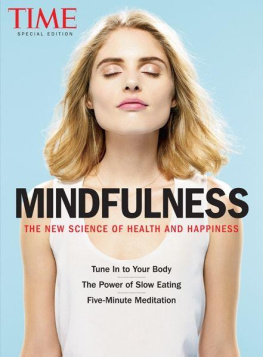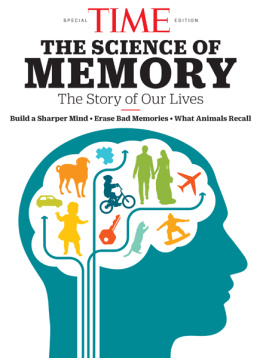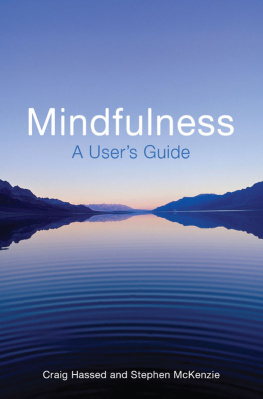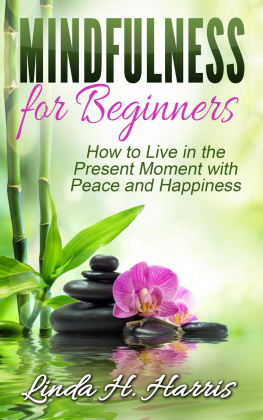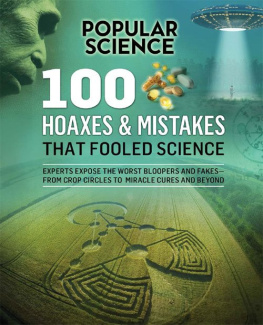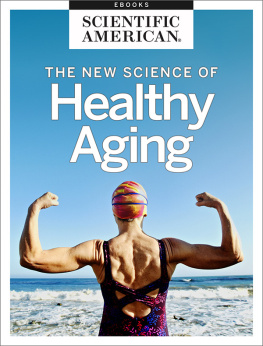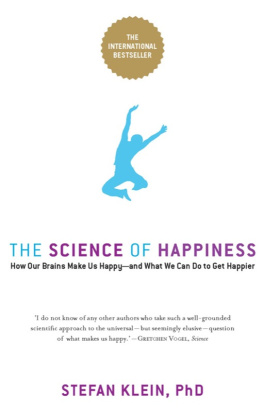The Editors of TIME - TIME Mindfulness: The New Science of Health and Happiness
Here you can read online The Editors of TIME - TIME Mindfulness: The New Science of Health and Happiness full text of the book (entire story) in english for free. Download pdf and epub, get meaning, cover and reviews about this ebook. year: 2016, publisher: Time, genre: Romance novel. Description of the work, (preface) as well as reviews are available. Best literature library LitArk.com created for fans of good reading and offers a wide selection of genres:
Romance novel
Science fiction
Adventure
Detective
Science
History
Home and family
Prose
Art
Politics
Computer
Non-fiction
Religion
Business
Children
Humor
Choose a favorite category and find really read worthwhile books. Enjoy immersion in the world of imagination, feel the emotions of the characters or learn something new for yourself, make an fascinating discovery.
- Book:TIME Mindfulness: The New Science of Health and Happiness
- Author:
- Publisher:Time
- Genre:
- Year:2016
- Rating:4 / 5
- Favourites:Add to favourites
- Your mark:
- 80
- 1
- 2
- 3
- 4
- 5
TIME Mindfulness: The New Science of Health and Happiness: summary, description and annotation
We offer to read an annotation, description, summary or preface (depends on what the author of the book "TIME Mindfulness: The New Science of Health and Happiness" wrote himself). If you haven't found the necessary information about the book — write in the comments, we will try to find it.
The Editors of TIME: author's other books
Who wrote TIME Mindfulness: The New Science of Health and Happiness? Find out the surname, the name of the author of the book and a list of all author's works by series.
TIME Mindfulness: The New Science of Health and Happiness — read online for free the complete book (whole text) full work
Below is the text of the book, divided by pages. System saving the place of the last page read, allows you to conveniently read the book "TIME Mindfulness: The New Science of Health and Happiness" online for free, without having to search again every time where you left off. Put a bookmark, and you can go to the page where you finished reading at any time.
Font size:
Interval:
Bookmark:
SPECIAL  EDITION
EDITION

MINDFULNESS
The New Science of Health and Happiness
Contents

Parts of this edition appeared previously in TIME, Health and Real Simple.
BEING HERE
Just because youre busy and distracted, that doesnt mean you have to miss out on life
By Lisa Lombardi

WE HAVE ALL HAD THOSE MOMENTS of: Im here, but Im not here.
Mine came while I was in the bleachers at my then-7-year-olds baseball game. Mom, my son called out from the field, look up from your phone. I dont want you to get hit with the ball!
The other parents around me laughedbecause I was busted, and also because who couldnt relate?
We live in a time when we can be present in so many moments, almost as they happen, across the globe. Watch a college roommate reach the summit of Mount Rainier in real time. Skype with the kids from a business trip in Asia. See a streaming video of your newborn niece wriggle 30 seconds after she comes out into the world. We have access to those astonishing moments, and we wouldnt have it any other way. But what about the moments unfolding right in front of us? The ordinary ones. That Little League game. The last out and the nice hustle off the field, the sound of the players rhyming chants and the warmth from having parked yourself in the last patch of afternoon sunlight.
Being mindful in the real world isnt always easy, but if we get even a little better at it, we benefit in crucial ways. A growing body of research attests to the profound mind-body benefits of getting centered. Mindfulness techniques, including .
Clearing your mind can also lead to deeper thinking, reveals a new study published in Psychological Science . Researchers Moshe Bar and Shira Baror set up experiments in which people were given a collection of numbers to remember and then asked to free-associate words. Some groups were asked to remember fewer numbers than the other groups. The people who had more numbers in their head consistently gave the least creative, most statistically common replies (such as white/black), while the ones with fewer numbers weighing down their brain consistently gave the more imaginative responses (white/cloud) and responded in less time. The likely explanation: having a cluttered brain gets in the way of deep and agile thinking.
Mental load, such as to-do lists, is a part of life, and we have to accept it, but we should be aware of its influences on our subjective experience, explains Bar, a neuroscientist and the director of the Multidisciplinary Brain Research Center at Bar-Ilan University in Israel. Any such load consumes some of our mental resources, thereby diminishing what we can allocate to the experience before us. A clearer mind affords a fuller experience.
Stress and ruminations tax our ability to be creative as well as to really immerse ourselves in experiences, adds Bar, who is also a professor at Harvard Medical School. Why? Our brain normally switches between exploratory and exploitatory modes. In exploratory mode were open to new experiences and have a desire to learn, even if theres risk involved. This is how many of us operate on trips to new places. In exploitatory function, on the other hand, we tend to rely on existing knowledge and lean toward predictable situations. When our mental capacity is loaded, we are more exploitatory and less creative, Bar says.
The solution, as with so many things, is stress reduction. Meditation, yoga and aerobic exercise can help you achieve, as Bar puts it, relatively rapid calmness of mind, so every day feels a little more like an adventureand not because you just got hit in the head with a ball.
PART ONE
Outsmart Stress

WHY EVERY MIND NEEDS MINDFULNESS
More and more of us are looking for peace in our crazy-busy daysand discovering that being present is its own reward
By Mary Elizabeth Williams

I AM BRINGING MY AWARENESS outward. I am perceiving the dense humidity of a summer afternoon as I stand on a city sidewalk and the way the hot air feels inside my lungs. I am present to observe the passage of time and how it seems somehow slowed down. I am cognizant of sharing this space with a small cluster of men and women around me. Or to put it another way, the meditation teacher has stood up the class. Some days, the lessons in mindfulness take you in unexpected directions.
Ask 10 people to define mindfulness, and youll likely get 10 different responses. But the basic concept of the word is straightforward. Its about putting down our juggling balls for a little bit. Its about embracing the beauty of monotasking. Its about, as mindfulness author and instructor Jon Kabat-Zinn has put it, paying attention in a particular way: on purpose, in the present moment and non-judgmentally.
Though the contemplative practice has its roots in several of the worlds major belief systemsmost recognizably Buddhism but also in Hinduism, Judaism and Christianityyou dont have to subscribe to any particular religion or philosophy to experience mindfulness. And if lately youve felt that some psychic decluttering might be just what the doctor ordered, youre far from alone.
Its no coincidence that as we find ourselves increasingly barraged with distractionsa 2013 University of Southern California study estimated that the average American consumes an astonishing 13-plus hours of media a daywe simultaneously find ourselves in the midst of a mindfulness revolution. You can see evidence everywhere. Hospitals across the country are increasingly using meditation, yoga, guided imagery and similar alternative practices as part of the health-care offerings to patients undergoing surgery, pain management, cancer treatment and more. Corporations such as American Express and Nike have been jumping on the bandwagon, taking mindfulness training programs to their staff. Apps like Headspacea gym membership for your mindhave been downloaded millions of times. A 2012 study by the National Institutes of Health found that more than 33% of Americans said they had used alternative health practices, including meditation, over the course of the year.
I am a longtime, if erratic and extraordinarily imperfect, practitioner of meditation. But recently, as the demands of 21st-century lifework, parenting, a seemingly limitless and often self-imposed deluge of emails to answer and texts to reply to and Instagram posts to Likehave ramped up, Ive found myself embracing one of the greatest side effects of my practice: the mindfulness that helps calm me wherever and whenever, even in the midst of my most cacophonous moments. And like a growing population of individuals similarly chafing against the rigors of what the writer Linda Stone has aptly diagnosed as continuous partial attention, Ive experienced the proven physical and mental benefits of regular pauses.
HEALTH BENEFITS
The perks of mindfulness are tangible. The American Psychological Association cites it as a hopeful strategy for alleviating depression, anxiety and pain. But mindfulness doesnt just seem to boost mood and perceptionthe effects go deeper. Mindfulness practice can shrink the brains jumpy fight or flight center, the amygdala, according to 2013 research out of the University of Pittsburgh and Carnegie Mellon University. Another study, done at the University of WisconsinMadison, found that people who meditate regularly have different patterns of brain electricity, potentially leading to more efficient attention-paying and learning. Change your thoughts, and maybe you can even change your brain.
Next pageFont size:
Interval:
Bookmark:
Similar books «TIME Mindfulness: The New Science of Health and Happiness»
Look at similar books to TIME Mindfulness: The New Science of Health and Happiness. We have selected literature similar in name and meaning in the hope of providing readers with more options to find new, interesting, not yet read works.
Discussion, reviews of the book TIME Mindfulness: The New Science of Health and Happiness and just readers' own opinions. Leave your comments, write what you think about the work, its meaning or the main characters. Specify what exactly you liked and what you didn't like, and why you think so.

